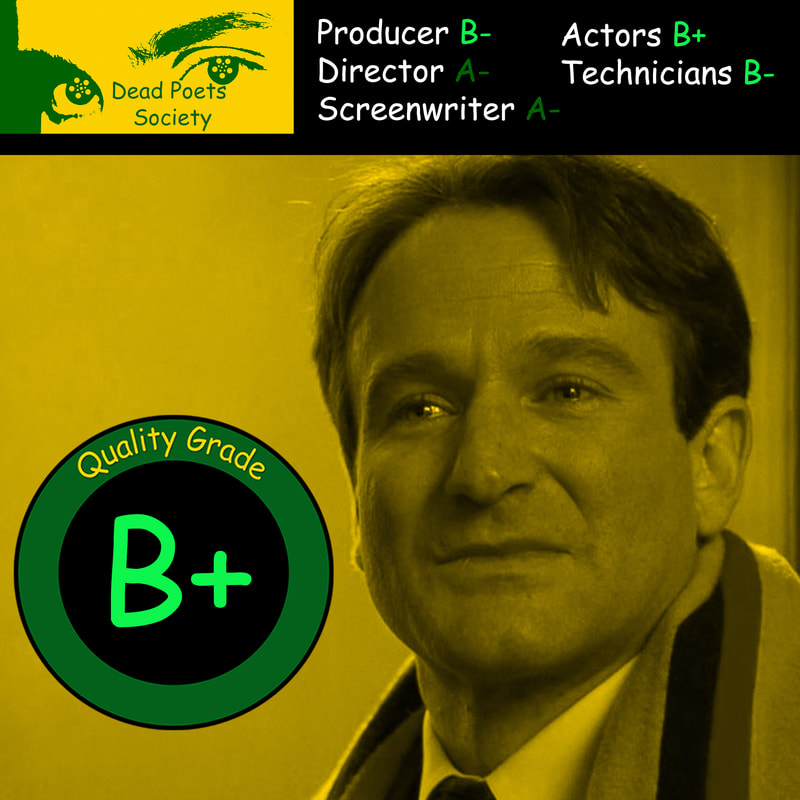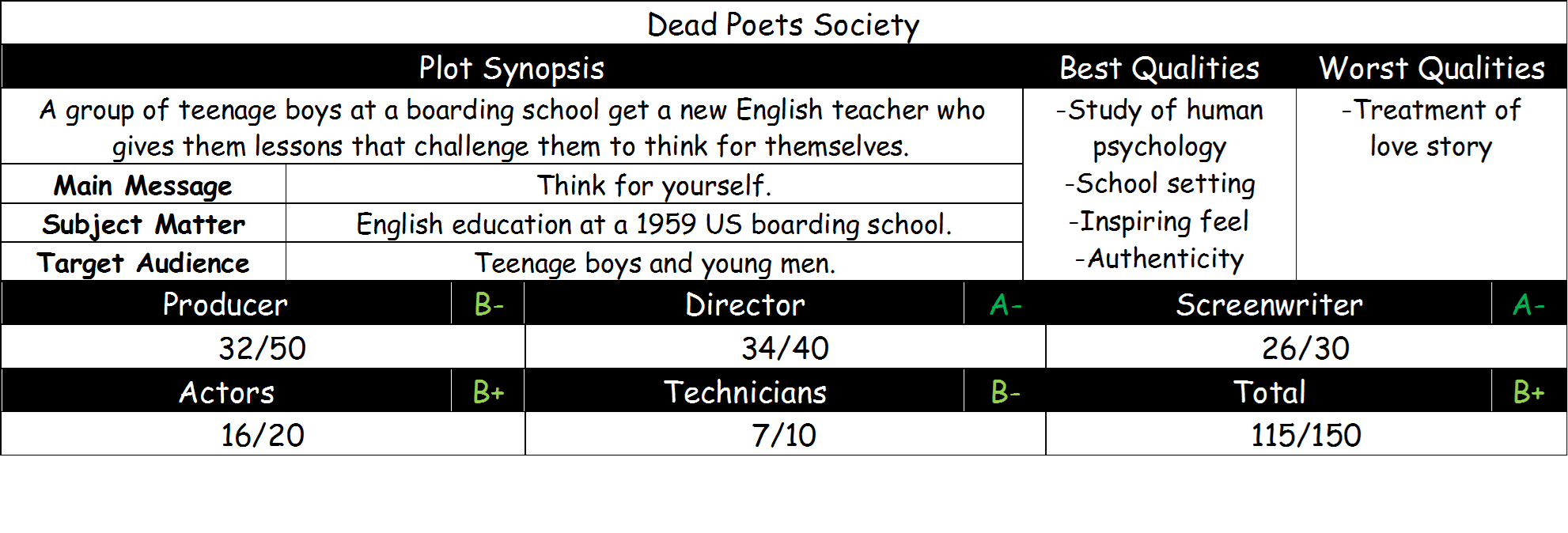Click here to see how I came up with all my scores.
Review:
Wow! What more is there to say about this wonderful testament to free-will that hasn’t already been said? First, every one of these actors is amazing in their respective roles. Even then, that’s just a small part of what makes the nearly thirty-years-old Dead Poets Society so great- it’s hardly aged a day!
Before I talk much further about this heavily praised gem that deserves its attention over the many years, I should go over some things that it admittedly doesn’t do so well. The cinematographer, John Seale, (The English Patient, Mad Max: Fury Road) isn’t too lively with the camerawork, as when there isn’t the distinctive beautifully composed shot, all other scenes look standard and even a little boring. One other complaint I have is the scenes with Knox’s love interest, Chris, who gives an insensitive performance that in turn makes her scenes horrible to watch.
But that’s pretty much it. The thing that stood out to me the most this third time watching it was the natural, brave performance by Robin Williams. Seriously, how did he not win the Oscar for Best Actor? He should have been considered for Supporting Actor, since that’s what he is here, then Daniel-Day Lewis could have kept his win for My Left Foot and Robin would have taken an award for his miraculous portrayal here. From his first “O Captain, my Captain,” you immediately know his performance will be amazing! He even gets to do his iconic improvisations in a few scenes, yet still in tune to the rhythm of a true modern lyricist that makes him sound very much animated with every word. All the other educators call their students “failures,” unlike this new out of the flow teacher who encourages page ripping from their given textbooks.
But this oppressive learning structure made by White men for White men is bleak compared to the new approach to White manhood this film discusses in its meditative world building. It starts off with a ceremonial focus on steady banners and bagpipes, then throws it all off course with a spinning camera that orbits an on-the-spot verse with the reciter’s eyes closed in front of the class. You even get to see a heavenly light from a book in the first meeting of the DPS, especially with mist behind to complement the feel, which gives these adolescents something they never got from traditional classwork: community. But what’s a strong community without a strong leader? That’s what Robin Williams stands as for these learners, an angelic aura backlighting him in times when he becomes a true savior on an individual basis.
As a result, you can really see the young men’s outlook upon the rest of their outer culture. The key to their realism comes from the dialogue, which stays focused on the individual’s condition as each speaker focuses on themselves as they talk. This hidden society they all partake in initiates all the conflict, creating amazing scene after amazing scene, until you just naturally fall in love with poetry and want to study it.
The boy with the most amount of attention, Neil, is challenged about his own moral standards when caught between the world of his parents and the world of his new home. He’s even forced to respond to his father by saying, “yes, sir,” which subtly tells you about the loveless relationship they share.
Now, what’s an impactful character and social study without a beautiful looking world to go with it? Director Peter Weir (The Truman Show, Witness) uses the best of Fall sunset colors to create all sorts of gorgeous views. Flocks of birds gradually fill the entire screen, a bagpiper stands silhouetted against a sunset reflected off the dock, and blue fog mystifies DPS meetings as the members don black hoods. Then as the cold despair of the third act comes around, everything goes from hot fall leaves to snow. It’s a beautiful form of visual poesy that demonstrates exactly what film exists for: a strong testament to the power of literature in a time when wisdom was not valued. It stays true to what self-expression really means, as told in its 1989 mindset, a time when nobody had their minds on the right things, one that even now after nearly thirty years puts us on the right track. It all explains how you should look into yourself, beyond merely saying you should.
That is what makes this setting feel so real. This whole area they are forced to learn in appears appropriately to be a land of living death considering what we know about the culture, right down to the leaves they must tread on day after day as they go to their next lecture. It’s much different from the four pillars to success this educational board wants its students to recite: Tradition, Discipline, Honor, Excellence. Rather, it says how your employment success is nothing compared to your spiritual condition, going against all assumption of the 1980s.
Therefore, I highly, highly encourage you to watch this amazing movie. If you have already watched it, watch it again. In all the depicted highs and lows of your own mind, it makes you feel uncomfortable but at the same time feel like you just had a worthwhile conversation with a close friend. Isn’t that what movies should do? Inspire us to pursue our better selves and not fall victim to the patterns of the world?
Wow! What more is there to say about this wonderful testament to free-will that hasn’t already been said? First, every one of these actors is amazing in their respective roles. Even then, that’s just a small part of what makes the nearly thirty-years-old Dead Poets Society so great- it’s hardly aged a day!
Before I talk much further about this heavily praised gem that deserves its attention over the many years, I should go over some things that it admittedly doesn’t do so well. The cinematographer, John Seale, (The English Patient, Mad Max: Fury Road) isn’t too lively with the camerawork, as when there isn’t the distinctive beautifully composed shot, all other scenes look standard and even a little boring. One other complaint I have is the scenes with Knox’s love interest, Chris, who gives an insensitive performance that in turn makes her scenes horrible to watch.
But that’s pretty much it. The thing that stood out to me the most this third time watching it was the natural, brave performance by Robin Williams. Seriously, how did he not win the Oscar for Best Actor? He should have been considered for Supporting Actor, since that’s what he is here, then Daniel-Day Lewis could have kept his win for My Left Foot and Robin would have taken an award for his miraculous portrayal here. From his first “O Captain, my Captain,” you immediately know his performance will be amazing! He even gets to do his iconic improvisations in a few scenes, yet still in tune to the rhythm of a true modern lyricist that makes him sound very much animated with every word. All the other educators call their students “failures,” unlike this new out of the flow teacher who encourages page ripping from their given textbooks.
But this oppressive learning structure made by White men for White men is bleak compared to the new approach to White manhood this film discusses in its meditative world building. It starts off with a ceremonial focus on steady banners and bagpipes, then throws it all off course with a spinning camera that orbits an on-the-spot verse with the reciter’s eyes closed in front of the class. You even get to see a heavenly light from a book in the first meeting of the DPS, especially with mist behind to complement the feel, which gives these adolescents something they never got from traditional classwork: community. But what’s a strong community without a strong leader? That’s what Robin Williams stands as for these learners, an angelic aura backlighting him in times when he becomes a true savior on an individual basis.
As a result, you can really see the young men’s outlook upon the rest of their outer culture. The key to their realism comes from the dialogue, which stays focused on the individual’s condition as each speaker focuses on themselves as they talk. This hidden society they all partake in initiates all the conflict, creating amazing scene after amazing scene, until you just naturally fall in love with poetry and want to study it.
The boy with the most amount of attention, Neil, is challenged about his own moral standards when caught between the world of his parents and the world of his new home. He’s even forced to respond to his father by saying, “yes, sir,” which subtly tells you about the loveless relationship they share.
Now, what’s an impactful character and social study without a beautiful looking world to go with it? Director Peter Weir (The Truman Show, Witness) uses the best of Fall sunset colors to create all sorts of gorgeous views. Flocks of birds gradually fill the entire screen, a bagpiper stands silhouetted against a sunset reflected off the dock, and blue fog mystifies DPS meetings as the members don black hoods. Then as the cold despair of the third act comes around, everything goes from hot fall leaves to snow. It’s a beautiful form of visual poesy that demonstrates exactly what film exists for: a strong testament to the power of literature in a time when wisdom was not valued. It stays true to what self-expression really means, as told in its 1989 mindset, a time when nobody had their minds on the right things, one that even now after nearly thirty years puts us on the right track. It all explains how you should look into yourself, beyond merely saying you should.
That is what makes this setting feel so real. This whole area they are forced to learn in appears appropriately to be a land of living death considering what we know about the culture, right down to the leaves they must tread on day after day as they go to their next lecture. It’s much different from the four pillars to success this educational board wants its students to recite: Tradition, Discipline, Honor, Excellence. Rather, it says how your employment success is nothing compared to your spiritual condition, going against all assumption of the 1980s.
Therefore, I highly, highly encourage you to watch this amazing movie. If you have already watched it, watch it again. In all the depicted highs and lows of your own mind, it makes you feel uncomfortable but at the same time feel like you just had a worthwhile conversation with a close friend. Isn’t that what movies should do? Inspire us to pursue our better selves and not fall victim to the patterns of the world?
Thanks so much for your time in reading! Please subscribe to my site for more updates on reviews.
If there is a specific movie you’d like to see graded, or if you are interested in guest blogging for my site, please email me at [email protected] for your recommendations.
Have a great weekend, and happy watching!
If there is a specific movie you’d like to see graded, or if you are interested in guest blogging for my site, please email me at [email protected] for your recommendations.
Have a great weekend, and happy watching!
Sources:
“Carpe diem da l’attimo fuggente.” Digital image. ParlandoSparlando. 16 Oct 2013. Web. <http://www.parlandosparlando.com/carpe-diem/>.
“Carpe diem da l’attimo fuggente.” Digital image. ParlandoSparlando. 16 Oct 2013. Web. <http://www.parlandosparlando.com/carpe-diem/>.


 RSS Feed
RSS Feed
